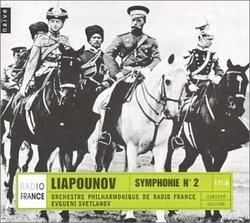| All Artists: Sergey Lyapunov, Evgeny Svetlanov, Radio France Philharmonic Orchestra Title: Liapounov: Symphonie No. 2 Members Wishing: 0 Total Copies: 0 Label: Valois Release Date: 4/20/2004 Genre: Classical Styles: Historical Periods, Modern, 20th, & 21st Century, Symphonies Number of Discs: 1 SwapaCD Credits: 1 UPC: 822186049747 |
Search - Sergey Lyapunov, Evgeny Svetlanov, Radio France Philharmonic Orchestra :: Liapounov: Symphonie No. 2
 | Sergey Lyapunov, Evgeny Svetlanov, Radio France Philharmonic Orchestra Liapounov: Symphonie No. 2 Genre: Classical
|
Larger Image |
CD DetailsSimilar CDs
|
CD ReviewsAnother Neglected Composer V. N. Dvornychenko | Rockville, MD | 05/05/2005 (3 out of 5 stars) "Poor Sergey Lyapunov! Born too late to be a founder of the Russian Nationalist School of music, and too early for the "Stravinsky revolution," he has been relegated as a duller clone of Balakirev. This recording of his Symphony No. 2 in B Flat minor, Opus 66, gives us a new and independent glimpse into his capabilities.
The liner notes to this CD, by Michel Cresta, state that the work is "a tribute to the great Russian symphonic tradition of the previous century." This might lead us to expect a kind of apotheosis of the 19th century Russian symphony - a fusion of Balakirev, Tchaikovsky, and Anton Rubinstein ... all with a Mendelssohnian clarity. But the listener expecting this will be disappointed. For what we have is a horse of an entirely different color. Cast in the Wagner-Liszt-Sriabin tradition - with a heavy dose of impressionism - the symphony is more closely related to Rimsky-Korsakov's "Antar" Symphony, Tchaikovsky's "Manfred," the symphonies of Scriabin, and Gliere's "Ilya Mourometz." There is one problem with this type of work. For a symphony to be truly great it needs two things: a "gotcha" to catch our attention upon first hearing, and successive layers of background which provide new revelations during subsequent hearings. The "gotcha" can be a memorable tune, an arresting rhythm (e.g., Beethoven's Fifth), or a fascinating texture (e.g., the opening of Brahms First). Impressionistic works often lack these. The transitions between melodies are diffuse; melodies flow and ebb, driven by hidden tidal forces which are difficult to predict. Of course there is nothing wrong with this kind of music, and some prefer it. But is makes it more difficult to walk away with a strong first impression. If one listens to this symphony with diffuse attention - listening but not consciously analyzing - one often gets the distinct impression of a Hollywood film score. At first this is a surprise -after all, the symphony was written in 1917! Further reflection leads us to conclude that it is the impressionistic elements which form this common link. Sergey Mikhailovich Lyapunov (also spelled Liapunov) was born on 30 November 1859 in Yaroslav, Russia. He died in 1924 in Paris, France. He received musical training from Tchaikovsky and Taneyev before joining Balakirev's Free School of Music. He became, in effect, the second generation of Balakirev's disciples, following the "Mighty Handful." Some feel that the domineering Balakirev unduly influenced Lyapunov, but there is little doubt that Balakirev contributed to Lyapunov's nationalistic development. The Second Symphony was written in 1917; Balakirev died in 1910. So this work was written after Lyapunov became free of any undue influence from his domineering mentor. Thus we may expect the work to reveal the true essence of Lyapunov's art. Following the Revolution and Civil War Lyapunov fled to the West, eventually settling in Paris. His defection resulted in a persona non grata status within the Soviet Union, hurting his reputation. The great Russian conductor, Yevgeny Svetlanov, conducts the Orchestre Philharmonique de Radio France. Svetlanov encountered some problem with the Russian authorities and moved to France. While both conductor and orchestra are first rate, one gets the impression they have not rehearsed together to the required degree. This coupled with a live recording, produce a muddy sound. Perhaps we will need to wait for a crisper recording to form a final opinion of Lyapunov's work. " |

 Track Listings (4) - Disc #1
Track Listings (4) - Disc #1


